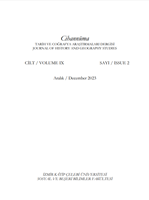GEÇ ORTAÇAĞ’DA KATALAN ÂLİMLERİN İSLÂM TASAVVURU VE MİSYONERLİK FAALİYETLERİ
THE PERCEPTION OF ISLAM AND MISSIONARY ACTIVITIES OF CATALAN SCHOLARS IN THE LATE MIDDLE AGES
Author(s): Enes ŞanalSubject(s): Cultural history, Social history, 13th to 14th Centuries, 15th Century, Sociology of Religion
Published by: İzmir Kâtip Çelebi Üniversitesi, Sosyal ve Beşeri Bilimler Fakültesi
Keywords: Al-Andalus; Spain; Catalan; Ramon Peñafort; Ramon Martí; Ramon Llull; Francesc Eiximenis;
Summary/Abstract: In the centuries following the conquest of al-Andalus by Muslims in 711, this geography was home to the beliefs of Islam, Christianity, and Judaism for eight centuries. In the few centuries following the conquest, Muslims constituted the overwhelming majority of Andalusian society as a result of intense Islamization among Christians. With the adoption of Islam by large masses in Europe for the first time, some Christians in the Iberian Peninsula began to see this religion as a clear threat to Christianity. The anti-Islamic discourse that began with Alvaro of Cordoba (d. 861), who harshly criticized the influence of Islamic culture on Christians in al-Andalus, was continued in a more systematic manner in the Iberian Peninsula in the following centuries by Christians such as Petrus Alfonsi (d. 1140), Peter the Venerable (d. 1156) and Mark of Toledo (d. 1216). After nearly five centuries of Islamic rule, Andalusian cities such as Cordoba, Seville and Murcia fell to the Christians in the 13th century, which inevitably intensified interreligious contacts in the region. Some Catalan scholars in Christian Spain, where Islam was perceived as a threat in the late Middle Ages, made special efforts to invite Muslims to Christianity. They not only put forward arguments for Muslims to convert to Christianity, but also developed new methods in political, military, religious and cultural matters that were unprecedented in the Christian West. This study aims to determine the perception of Islam and missionary activities of Ramon Peñafort (d. 1275), Ramon Martí (d. 1292), Ramon Llull (d. 1316) and Francesc Eiximenis (d. 1406) who are the most important Catalan scholars of the period, in the light of the Catalan and Latin sources of the late Middle Ages. Thus, it will be revealed how similar and different the perceptions of Islam of these four Catalan scholars have from their religious colleagues who lived in the region before them and came forward with their anti-Islamic ideas.
Journal: Cihannüma: Tarih ve Coğrafya Araştırmaları Dergisi
- Issue Year: IX/2023
- Issue No: 2
- Page Range: 91-115
- Page Count: 25
- Language: Turkish

